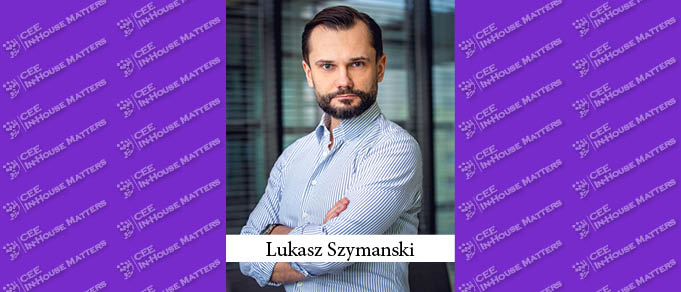Lukasz Szymanski, General Counsel and Business Integrity Officer at Unilever Poland, Baltics & CEE, describes for CEE In-House Matters how a values-based approach leads to Business Integrity.
CEEIHM: Please tell us a few words about yourself and your current role with Unilever.
Lukasz: I am a Poland-qualified attorney at law. Before joining Unilever in 2012, I advised primarily on energy law and finance. I also handled quite a lot of litigation cases. When I look back at joining Unilever eight years ago, I was very lucky to have had such a wide background. My previous experience helped me handle my obligations at Unilever much better.
I first joined the company as a competition law advisor. However, at the end of 2015, I became the General Counsel for the region, and I started managing a team of five people. I am also double-heading as a Business Integrity Officer.
CEEIHM: What does "Business Integrity Officer" mean, exactly?
Lukasz: There are at least two ways of establishing an ethics system in a company. For example, one way is to have a compliance system. Another is to have a business integrity system. Of course, each company can choose its own.
The compliance system was very well integrated at Unilever. It was introduced many years before I joined the company. So, when I joined, I became a compliance officer. A few years back, however, Unilever made a decision to switch to a business integrity system, so the title of my role changed as well. But, the change was not only in name. Name in and of itself is not important. The values a particular system promotes is what is important. It is also important how the company wants to share those values with its employees. One way to do so is through having a business integrity officer.
In addition, every employee can share his or her concerns about the company’s policies with the BIO. We have a no-retaliation policy, which means there are no wrong questions. People can also remain anonymous if they prefer. Employees need to be 100% certain that they will face no consequences for voicing their opinions, or the system will fail.
I handle between 70% and 80% of all BI cases in the company. Not only do I need to help people become aware of certain rules and values, but also gain their trust. It is a very time consuming, but also a very rewarding process.
CEEIHM: And how does that differ from traditional compliance?
Lukasz: Compliance is all about the rules that come from the government. Compliance is about strict rules that need to be upheld in the company and there are sanctions for their breach. Compliance is quite straightforward, yet devoid of emotions. And since these rules are not always clear, people sometimes do not know why they should follow them.
On the other hand, business integrity is not about rules, but rather about values. Of course, certain rules stem from these values, but the starting position is different. Even though we have certain rules in place, this system is not about overburdening people with them. It is a friendlier approach based on emotions and explaining to people why the rules are important. In a nutshell, business integrity means doing well even when nobody is watching.
Our driver is to properly communicate certain values to our employees so that we can share them together. That way the rules become more intuitive, clearer, and easier to follow, and in turn, the company functions in a more harmonized way.
CEEIHM: What additional tools do you need to employ beyond the "traditional" compliance function?
Lukasz: We have our Code, which consists of 24 or 25 policies. How you turn them into values depends on the company’s approach. The way we do it at Unilever is to allow every person to ask different questions based not necessarily on the provisions of certain policies, but rather on a common sense of what is good and what is bad. The function of business integrity is to build trust and openness. So, we tend to listen to people, instead of threatening that they will lose their job if they breach a certain rule. We try to understand and help them. That is how positive emotion is created in a company.
CEEIHM: What skillset/knowledge does a GC need in order to implement this approach and these additional tools beyond what is traditionally expected of a Head of Compliance?
Lukasz: I think you need to have good communication skills and proper internal standards of behavior. If you compare compliance functions and BI functions from the point of policies, I think they can be quite similar, albeit with slight variation in wording.
However, the main difference is how you want to introduce this system and communicate it to the people. Compliance sets up rules and sanctions, without conveying values. Those rules are often written in an unfriendly, legal language.
Business integrity, on the other hand, communicates values based on which the company’s policies are made.
CEEIHM: Is your team shaped differently now with this Business Integrity function in place than it was before?
Lukasz: No, I don’t think so. Based on my experience, I would say that there is no need for a team to be structured in a different way. However, it is important for different members of the team to be specialized in different areas.
Let us take the production of shampoo as an example. When buying shampoo at a store, people only see the plastic bottle and it seems like a simple thing. However, this business is very complicated, starting from the supply chain, procurement of ingredients, R&D, stakeholders, and so on. That is to say that different people need to be experts in different fields, so they can handle certain aspects of a transaction. Handling business integrity is similar in that way.
CEEIHM: How does one implement business integrity beyond the internal scope? How do you create that culture when it comes to your external stakeholders?
Lukasz: We set high values for ourselves within the company, but we don’t stop there. We are trying to stimulate our vendors and customers to share our values. To that end, for example, we always try to make sure that our customers are compliant with relevant laws in their jurisdiction.
We also state which values are important to us, and we ask our customers to confirm that they share them as well and that they will follow the rules. Our goal is to work only with companies that abide by the law.
We expect our vendors, for example in the tender procedure, to confirm that they are on the same page as we are, so to speak. They are obligated to follow the basic rules and, if they breach them, we have an opportunity to terminate the contract.
Of course, it would be much easier and cheaper to only focus on ourselves. We could say that the conduct of other companies is none of our business. However, Unilever is a company that holds to its values and is dedicated to upholding them in the outside world as well. That is why we need to make an environment in which our partners and clients will behave according to them.
This article was published in issue 1.2 of CEE In-House Matters. The full edition is available here in pdf format, here in e-reader format, and here in electronic format.


